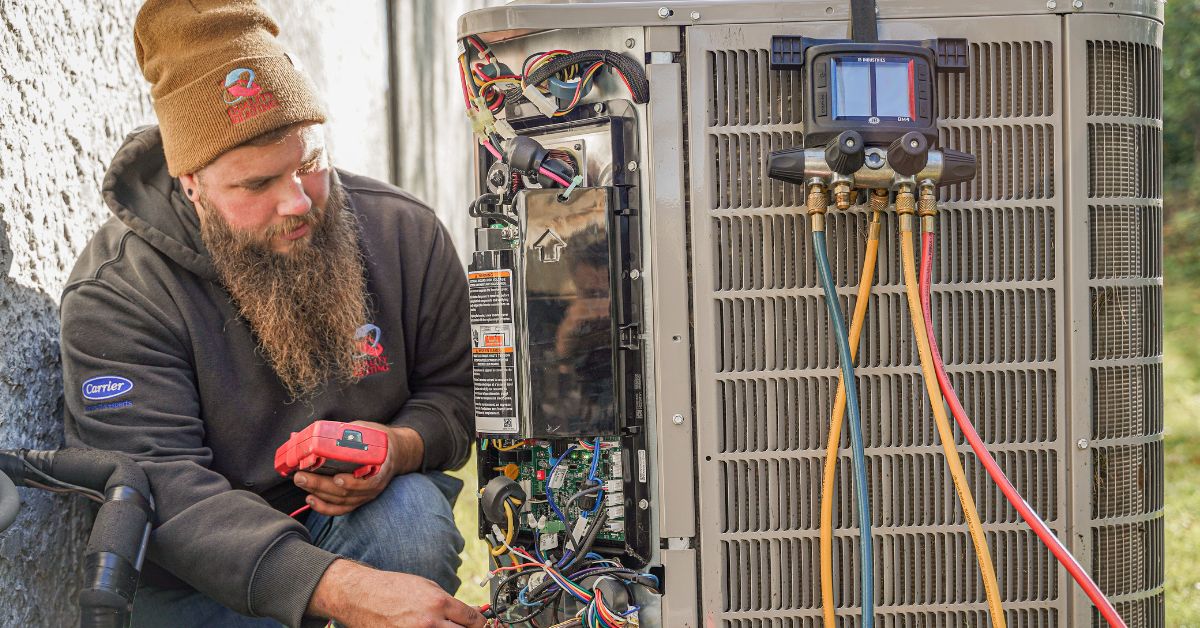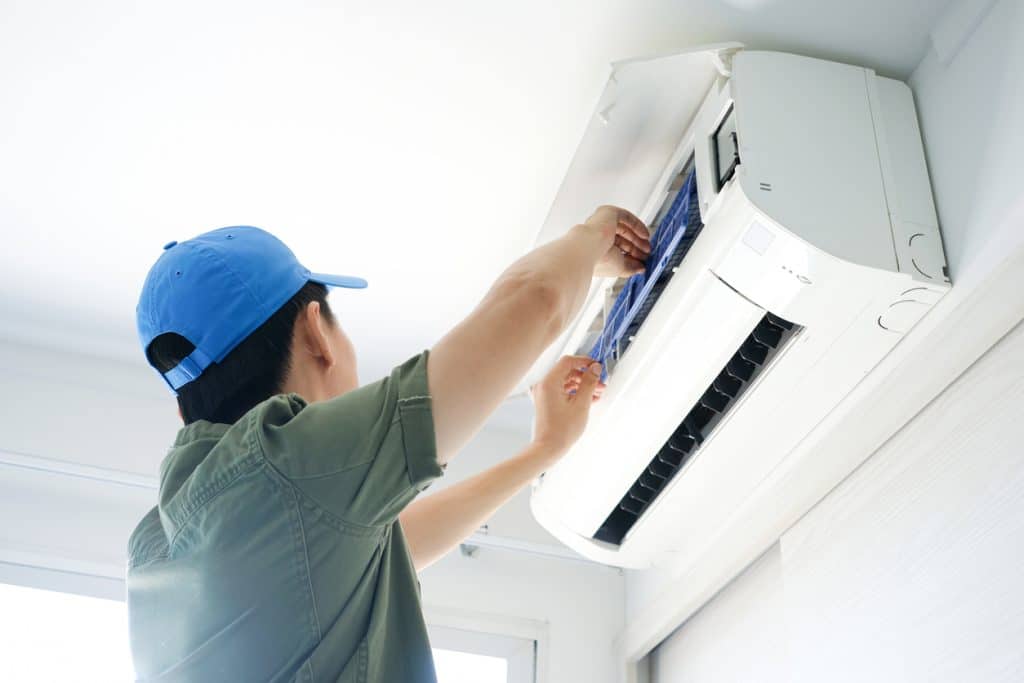How an HVAC company helps improve indoor air quality
Wiki Article
The Value of A/c Expertise: Discovering Root Causes Of Air Conditioning Issues for House Owners
Property owners frequently ignore the relevance of recognizing their a/c systems. Recognizing usual indications of air conditioning troubles can cause prompt interventions. Problems like not enough air conditioning or unusual noises are not just inconveniences; they can suggest much deeper concerns. By discovering the origin triggers of these issues, home owners can improve system performance and prolong its life expectancy. What are the most common issues that can occur, and how can they be effectively attended to?Typical Indicators of Air Conditioner Issues
How can house owners identify issues with their air conditioning systems prior to they rise? Acknowledging usual indicators of air conditioner issues is essential for timely maintenance. One prevalent indicator is insufficient air conditioning; if the a/c device fails to decrease the interior temperature, it might indicate underlying concerns. Uncommon sounds, such as grinding or hissing, can likewise indicate mechanical failings or loosened components - air conditioner repair. Additionally, home owners need to be careful of weird smells originating from the unit, which could suggest mold and mildew growth or electrical troubles. Constant biking on and off, referred to as short biking, can show thermostat issues or refrigerant leaks. Additionally, a rise in power costs without an equivalent increase in use might direct to inadequacy. By staying alert to these indication, home owners can avoid much more substantial problems and pricey repair work, ensuring their a/c systems run successfully throughout the warmer months
Understanding Refrigerant Issues
Refrigerant concerns can greatly impact the effectiveness of a cooling and heating system. Homeowners must know the indicators of low cooling agent degrees and the importance of finding refrigerant leakages. Attending to these troubles promptly can prevent further damages to the system and assurance optimal cooling performance.Low Cooling Agent Levels
An usual issue that property owners may run into with their heating and cooling systems is reduced cooling agent degrees, which can significantly impact the system's efficiency and performance. Cooling agent is important for the cooling process, absorbing warm from interior air and launching it outside. When levels drop, the cooling system struggles to cool the space successfully, resulting in raised power consumption and potential system strain. Signs and symptoms of low refrigerant include inadequate air conditioning, longer run times, and ice formation on the evaporator coils. Property owners might likewise discover uncommon sounds as the compressor works harder to make up for the shortage. It is essential for house owners to comprehend the value of preserving appropriate cooling agent degrees to guarantee peak cooling and heating performance and long life.Refrigerant Leaks Detection
Where might a homeowner begin when encountered with the opportunity of cooling agent leaks in their a/c system? The initial step involves keeping track of the system's performance. Indications such as minimized cooling efficiency, ice development on coils, or hissing audios may indicate a refrigerant leak. Homeowners should likewise look for noticeable signs of oil residue, typically a dead giveaway of a leakage. Making use of a cooling agent leak detector can supply even more precise identification. If uncertainties persist, seeking advice from a licensed a/c technician is essential, as they have the competence and equipment to situate leaks successfully. Trigger detection and repair work of cooling agent leakages not just improve system efficiency but additionally prevent potential environmental damage, making it an essential facet of a/c upkeep.Electrical Failures and Their Impact
Electric failures can substantially impact HVAC systems, particularly through problems like circuit breaker malfunctions and damaged circuitry. These issues not just interrupt the system's efficiency however can additionally bring about pricey repair services and safety hazards. Recognizing the effects of such failures is essential for homeowners to keep an efficient and risk-free HVAC setting.Breaker Issues
Just how can breaker issues affect the performance of a heating and cooling system? Circuit breakers serve as vital safety gadgets that handle electric flow to heating and cooling units. If a circuit breaker journeys frequently, it interferes with power supply, resulting in inconsistent heating or air conditioning. This can trigger considerable pressure on the system, leading to ineffective procedure and possible damage to elements. Home owners may see enhanced power bills due to the cooling and heating system's battle to keep wanted temperature levels. Additionally, duplicated interruptions from stumbled breakers can reduce the life-span of the air conditioning device, needing costly fixings or substitutes. Routine maintenance of circuit breakers is vital, as it ensures a steady power supply, inevitably enhancing the general effectiveness of the HVAC system.Faulty Wiring Consequences
Often neglected, defective electrical wiring can have alarming repercussions for cooling and heating systems. Circuitry issues might cause short circuits, leading to constant failures and increased fixing costs. In enhancement, improper circuitry can create ineffective power use, causing higher utility expenses and strain on the system. In extreme situations, faulty circuitry can set off electrical fires, presenting a considerable safety danger to homeowners. These electric failures can damage Heating and cooling elements, resulting in expensive substitutes or comprehensive repair work. Property owners must focus on normal assessments by certified specialists to determine and correct electrical wiring issues before they intensify. Recognizing the effects of faulty electrical wiring can aid assure the long life and safety and security of HVAC systems, ultimately protecting both the home and its residents.Clogged Filters and Their Repercussions
While several homeowners may overlook the significance of normal filter upkeep, clogged up filters can cause considerable effects for a/c systems. When filters become obstructed with dust, dirt, and particles, air movement is limited. This reduction in airflow compels the system to function harder, causing raised power consumption and possibly higher energy bills. Over time, this pressure can trigger deterioration on elements, leading to early system failing.Additionally, blocked filters can jeopardize interior air high quality. Contaminants and irritants might circulate throughout the home, worsening respiratory system problems and allergic reactions for residents. Furthermore, poor air flow can create the evaporator coil to freeze, bring about pricey fixings and inefficient air conditioning efficiency. Regularly transforming or cleaning filters is a basic yet vital maintenance task that can aid assure the long life and effectiveness of HVAC systems, inevitably benefiting both the property owner's convenience and their funds.

Thermostat Malfunctions Explained
What occurs when a thermostat breakdowns can greatly influence both convenience and power efficiency in a home (ac fix). A damaged thermostat might fall short to precisely read the temperature level, leading to overcooling or not enough cooling. This discrepancy can create discomfort for residents and lead to higher energy bills, as the heating and cooling system works harder than requiredUsual concerns consist of dead batteries, which can render digital thermostats defective, and loose electrical wiring that disrupts communication in between the thermostat and the heating and cooling unit. Additionally, out-of-date or badly adjusted thermostats may not respond correctly to temperature level modifications, further aggravating energy inadequacy.
House owners ought to be watchful for you can check here indications of breakdown, such as irregular temperature levels or unanticipated energy costs. Routine checks and understanding of the thermostat's capability can aid recognize issues early, guaranteeing peak performance of the a/c system. Dealing with thermostat concerns without delay is crucial for maintaining a comfortable living atmosphere and handling power consumption efficiently.
The Duty of Regular Upkeep
Routine upkeep plays an important function in guaranteeing the long life and efficiency of HVAC systems. Home owners who prioritize regular checks can stop small problems from intensifying into pricey fixings. Normal upkeep usually includes tasks such as cleaning up filters, examining ductwork, and examining cooling agent degrees. These activities aid maintain ideal airflow and system performance, reducing energy usage.A properly maintained A/c system runs much more efficiently, supplying consistent comfort throughout the home. Regular tune-ups can likewise extend the lifespan of the system, leading to considerable savings over time. Property owners are motivated to schedule specialist examinations at least annually to recognize potential troubles early.
In enhancement, many suppliers need normal upkeep to support guarantees, making this practice not site web only helpful yet commonly needed. Generally, recognizing the relevance of regular upkeep equips homeowners to secure their cooling and heating systems versus unforeseen failures and boost their investment in home convenience.
Frequently Asked Questions
How Can I Improve My Air conditioner's Power Efficiency?
Improving an AC's power effectiveness entails regular maintenance, cleaning or changing filters, securing ductwork, guaranteeing proper insulation, using programmable thermostats, and scheduling specialist inspections to determine and remedy possible issues influencing performance.
What Is the Life-span of a Regular A/c Device?
A regular air conditioning unit has a lifespan of 15 to 20 years, relying on upkeep, use, and environmental factors. Regular upkeep can considerably extend its functional life and improve total performance.
When Should I Replace My Cooling System?
An a/c system ought to generally be changed every 10 to 15 years. Indications for replacement consist of frequent repairs, rising energy costs, and inadequate air conditioning, suggesting that an upgrade may be extra cost-effective and reliable.Can I Repair Air Conditioning Problems Myself?
Yes, individuals can troubleshoot a/c troubles themselves by examining filters, making sure power supply, and checking for noticeable concerns (ac unit replacement). Nevertheless, complicated issues commonly require expert support for exact medical diagnosis and safe repair, guaranteeing ideal system efficiency
Just how Do I Choose a Reliable Heating And Cooling Service Technician?

To select a trusted heating and cooling technician, one must look for suggestions, examine on the internet evaluations, validate licenses and insurance coverage, assess experience, and demand in-depth quotes to guarantee quality service and reasonable pricing prior to choosing.
Final thought
To sum up, a solid understanding of cooling and heating systems allows home owners to efficiently identify and resolve typical cooling problems. Acknowledging what does hvac stand for and what is its purpose signs such as poor cooling or climbing power costs enables timely interventions, which can considerably enhance system efficiency and longevity. By remaining notified about possible troubles like refrigerant leaks, electric failings, and blocked filters, homeowners can take aggressive procedures to preserve their systems, eventually guaranteeing convenience and advertising a much healthier living atmosphere. Normal maintenance stays crucial to this venture.Report this wiki page